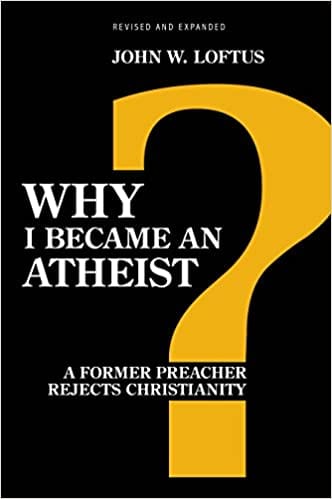(10-15-06)
John’s story was
posted on his
Debunking Christianity blog. His words will be in
blue.
* * * * *
In my book Why I Rejected Christianity: A Former Apologist Explains I’ve written 40 pages about my conversion to Christianity, my deconversion away from Christianity, what I believe now, and why. . . . But let me offer the Cliff Notes version:
I grew up being taught to believe in the Christian faith. In fact, until I converted at the age of 18 I never remember encountering anyone who didn’t believe. I just thought everyone around me believed. So when I found myself down on my luck at the age of 18 there was no one else I knew to turn to but Jesus, and I did.
I had a dramatic conversion as an 18 year old. I had dropped out of High School, and was arrested six different times for offenses like running away, theft, and battery. I had also hitchhiked around the country with a friend. I was heavily into drugs, alcohol, sex, fast cars, and the party scene.
But one night I gave myself over to this Jesus in repentance and faith in response to what I believed at that time was his substitutionary death on the cross for my sins. At that time I claimed to receive the gift of the Holy Spirit, and a new calling to spread God’s news of salvation to anyone who will believe.
And my life radically changed. Here’s how I later described my new life and new sense of mission in a newspaper devotional column that area ministers took turns writing every week: “I can identify with the apostle Paul who said, ‘But by the grace of God I am what I am’ (I Cor.15:10). I knew I needed help, but no one could break through to me, until I turned my life over to Jesus. Only he could save me. Only he could change me. I have totally changed due to the grace of God. When I look back on those years, it’s like I’m talking about someone else. Without God I shudder where I would be today. Now, I gladly preach the message that God can change you too. Believe it. It happened in my life. Believe that it can happen to your rebellious teenager. Believe it because we serve a miracle-working God who answers prayer, and who intervenes on our behalf.” Then I ended the devotional with these words: “From out of my own personal experience my heart bleeds for the victims in our society, for I know what it’s like to be a victim and a victimizer. That’s why I fight for the unborn, the poor and homeless, those victimized by pornography, but especially for those trapped in sin. People need the Lord.” [Herald Republican, August 10, 1990].
This is all fine and good, and I believe God’s grace was working there. Every good thing comes from God. A turn from all these sins must be by God’s grace. But notice that John gives no information as to the reasons that he converted, apart from wanting to forsake his civil and spiritual rebellion. So now he believed, but what were his reasons for adopting Christianity? Did he have any intellectual reasons: something beyond experience and wanting to get off of the rock-bottom of wild adolescent rebellion and the supposedly unretrained “free” life?
This is extremely important too. It’s a great reason why I have devoted my life to apologetics, because unless we develop a thinking Christianity, that can provide reasons and rationales for belief, we leave ourselves open to being deceived by any number of things. It’s a foundation of sand, in an apologetic sense. We’re easy prey. Without it, the next attractive vision of life that comes around could lead us away, because we never really could give solid reasons why we were Christians in the first place.
John may have had some sort of reasons, but he provides none here. Insofar as he didn’t (and I suspect that was the case, at least in this early stage, not as much later, since he got a theological education), then his quick conversion could be easily explained on a non-rational basis. And it is often seen that folks who will convert so quickly without the proper reflection may later do so again. In this case, it was from Christianity to atheism (and again in part due to personal crises, which often have little or nothing to do with competing truth claims).
With such a passion for my purportedly new relationship with God-in-Christ, I began to understand my faith and to minister it. I graduated from Great Lakes Christian (Bible) College, Lansing Michigan, in 1977. Afterward I became the Associate Minister in Kalkaska, MI, for two years. Then I attended Lincoln Christian Seminary (LCS), Lincoln, IL, and graduated in 1982 with M.A. and M.Div. degrees, under the mentoring of Dr. James D. Strauss. While at LCS I was the founding editor for the now defunct apologetical quarterly, A Journal For Christian Studies. After LCS I attended Trinity Evangelical Divinity School (TEDS), and graduated in 1985 with a Th.M degree, under the mentoring of Dr. William Lane Craig, considered by many to be the foremost defender of the empty tomb of Jesus and his bodily resurrection from the grave. I also took classes at Marquette University in a Ph.D. program with a double major in Philosophy and Ethics, but I didn’t finish because I lacked the needed funds to stay in school and because I wanted to be close to my Dad who was dying of cancer.
From 1987 to 1990 I was the Senior Minister of the Angola Christian Church, Angola, Indiana. I served in the Steuben County Ministerial Association, and for a year I was its President. Before that I had several ministries in Michigan, Wisconsin and Illinois. I was in the ministry for about fourteen years, or so. After leaving the church, I’ve stayed in Angola, and now I own my own business here.
Note and beware, Christians, that even a solid Christian education like this may not necessarily protect one from a slide into apostasy. The devil is very clever. He has ways to bring anyone down. We need to be vigilant, and to maintain an active, vital faith and spirituality. Cultivate it. Don’t squander opportunities to live out your faith and to be stretched in your obedience to God.
I was a Christian apologist with several master’s degrees set for the express purpose of defending Christianity from intellectual attacks.
Even that won’t suffice to prevent apostasy if there are other deficiencies because the mind is only one aspect of a well-rounded faith. That can get distorted too far in one direction, too. We don’t yet know what these might be in John’s case (as analyzed from a Christian perspective), but I will reply as I see fit, as we go along.
I was not afraid of any idea, because I was convinced that Christianity was true and could withstand all attacks. I have taught both apologetical and philosophical classes for a few different Christian and secular colleges. I was in the “Who’s Who Among America’s Best Teachers” in 1996.
Much philosophy can make one go astray as well, if too much skeptical and fallacious philosophy takes hold on one’s brain. But in the end it comes down to God’s grace and whether we accept it and continue to live by it, or reject it.
I knew most of the arguments against Christianity, and as a philosophy instructor in a secular college I could debate both sides of most any argument.
One can see the danger there, too. As G. K. Chesterton said, “one can become so open-minded that their brains fall out.” There is a reason many Christians lose their faith in college. If we expose ourselves to skepticism and don’t have the equipment to defend our faith (and especially if we like to blend in with the crowd and not be different and the “black sheep”), then we’re dead meat.
As a philosophy instructor, in many ways, I am a purveyor of doubt. Too many people have a superficial faith handed down from their parents. As a teacher my goal is to cause them to doubt much of what they believe, be it atheist or believer, or in between. Doing so is what’s needed for them to develop a deeper faith, and it allows them to see points of view they’ve never considered before, thus making them more tolerant of other people’s beliefs. One thing that I must do as a philosophy instructor is to eliminate from my students a smug, simplistic, and dogmatic belief system. Such beliefs are childlike and unbecoming of the adults they should become.
Philosophy and many other subjects can easily be taken in a direction that is hostile to Christianity. It doesn’t have to be that way. I believe that virtually all academic fields can be approached in a way that is either favorable to Christianity or neutral towards it. But note how easy it might be to go from opposing a “smug, simplistic, and dogmatic belief system” to equating all religious systems in such a manner, as if they are all simplistic, or as if all religious dogma is somehow improper, or fundamentally hostile to philosophy.
Hence, a famous atheist like Bertrand Russell could believe that truly Christian thinkers cannot, by definition, be philosophers. St. Thomas Aquinas and Leibniz and St. Augustine and Kierkegaard weren’t philosophers? Alvin Plantinga and William Alston aren’t philosophers today, simply because they are Christians and accept some “dogma”? That’s an odd categorization, isn’t it? But is that not far more dogmatic and closed-minded than a Christian simply holding his faith and doing philosophy too? We need to be aware of the trends of our own thought, lest we succumb to a slippery slope of an unbelieving heart taking hold and lest we get duped by truly stupid, utterly unnecessary dichotomies such as this “dogma vs. philosophy” or “faith vs. reason” claptrap.
Anyway, I have told people time and time again that I could teach philosophy until I was blue in the face so long as I knew I had a loving, caring, and faithful Christian community to fall back on after my class is over. When that fell through the floor, the doubts crept in my life.
Whether Christians in general or those in one’s own community are loving or hypocritical has nothing whatsoever to do with the truth claims of Christianity. Nothing. You could argue, I suppose, that if you see a great many Christian hypocrites, that what they present is (at least arguably) false. They haven’t shown the transformation or exemplary love and kindness that Christianity claims to especially produce. On the surface that appears plausible, but then the Christian can always produce an equal or greater number of those who are profound, stirring examples of Christianity in loving action: saintly, holy people.
So at best it would be a wash, I think. But in the end, belief-systems must be analyzed of their own accord. Whether people consistently live up to the ideals they professedly espouse is another question altogether. We would fully expect many to fail to live up to the extremely high and noble ideas of Christianity. It’s been said that of all Christian doctrines, original sin is the easiest to grasp as true. Saints are marveled at precisely because they are such exceptions to the rule.
There are three major things that happened in my life that changed my thinking. They all happened in the space of about five years, from 1991-1996. These are the three things that changed my thinking: 1) A major crisis, 2) plus information, 3) minus a sense of a loving, caring, Christian community.
#3 was just disposed of as a rational reason above. It’s rather self-evident. Personal crises (#1) are of the same nature, unless they can be tied to some actual problem in Christian theology or philosophical, apologetic rationale for same. The fact that my wife or child may die or that my reputation is ruined, or that I go bankrupt or get a fatal disease, or become handicapped due to an assault has nothing to do with, that I can see, of whether the truth claims of Christianity are acceptable or not. The fact of some Christian community manifesting some sin of lack of support or sympathy or empathy, or slanderous, gossipy conduct does not prove Christianity false, either. I agree that it is scandalous and a shame and a terribly bad witness, but it disproves nothing by way of doctrine and theology. “Information” is another story. We shall see what “information” was instrumental in turning John the pastor and Christian apologist into an atheist.
For me it was an assault of major proportions that if I still believed in the devil would say it was orchestrated by the legions of hell.
Many people can say that. Look at Job. Yet his crisis didn’t make him lose belief. Carrie Ten Boom was in the Nazi concentration camps, and Solzhenitsyn in the Gulag. They didn’t lose faith. The latter even credits the horrible experience with bringing him to faith. Such horrific experiences “orchestrated by hell” often have the opposite effect from the devil’s intentions: deepening faith. That’s why the number of early Christians grew by leaps and bounds, even though the movement was being persecuted to the death. The martyrdoms themselves became an extraordinary witness that something special was causing these people to willingly die with joy in the most outrageous ways rather than deny their faith. People know that’s not possible on merely human power alone. It contradicts everything we know about ourselves.
Let me just briefly mention the information that changed my mind. I carried on a correspondence debate with my cousin who was a Lieutenant in the Air Force (now a Colonel) and teaches Bio-Chemistry at a base in Colorado. I handed him a book arguing for creation over evolution and asked him to look at it and let me know what he thought of it. After several months he wrote me a long letter and sent me a box full of articles and books on the subject. Some of them were much too technical for me to understand, but I tried to read them. While he didn’t convince me of much at the time, he did convince me of one solid truth: the universe is as old as scientists say it is, and the consensus is that it is 12-15 billion years old.
Great. That has absolutely nothing to do with whether Christianity is true or not or whether God doesn’t exist. The fact that John managed to get up to speed with conventional geology proves nothing about the truth of a thinking, mainstream orthodox Christianity. So this has no bearing on any serious reason to deconvert. The choice is between Christianity and science? That would be the implied dichotomy and choice, but of course it is a fallacy. Most Christians accept this standard geology and indeed most even accept the theory of evolution in some form.
Now that by itself isn’t too harmful of an idea to Christian thinking. But two corollaries of that idea started me down the road to being the honest doubter I am today.
It’s good that he makes this statement. Yet he himself chose to include this as a starting-point of his unbelief, so it can’t be completely insignificant.
The first is that in Genesis chapter 1 we see that the earth existed before the sun, moon, and stars, which were all created on the fourth day. This doesn’t square with astronomy. So I began looking at the first chapters of Genesis, and as my thinking developed over time I came to the conclusion that those chapters are folk literature – myth. You can see my studies on this later in this book.
Okay; now we’re getting to the meat and potatoes and the brass tacks. Here we have something that can be analyzed, to see if it is any sort of legitimate rationale for rejecting Christianity. If John is correct, Genesis has a glaring contradiction. If he is not, then a big reason he gives for his apostasy is shown to be much ado about nothing. of course the latter is the case, as I will now proceed to show.
John assumes (as so many do) that Genesis was intended to be presented in some rigidly (modern) scientific, rationalistic framework, including a literal chronology of events, as it is written. But is this required by the text we have? No, not at all. And herein lies his fallacy and disinformation. He shows poor hermeneutical skills here. This never had to be a “reason” to make him start doubting the inspiration of Holy Scripture.
John H. Stek, in a book whose purpose is to examine the biblical account of creation from a scientific perspective, wrote about Genesis 1-2:
As representations of what has transpired in the divine arena, they are of the nature of metaphorical narrations. They relate what has taken place behind the veil, but translate it into images we can grasp – as do the biblical visions of the heavenly court. However realistic they seem, an essential “as if” quality pervades them.
. . . He stories “events” that are in themselves inaccessible to humans, inaccessible not only as information (since no human witness was there) but conceptually inaccessible.
. . . From the perspective of this account [Gen 1:1-2:3], these seven “days” are a completed time – the seventh day does not give way to an eighth . . . because this narrative stories unique events in a unique arena and a unique “time,” the lack of correlation between the chronological sequences of 1:1-2:3 and 2:4ff. involves no tension.
. . . The speculations that have continued to fund the endless and fruitless debate have all been triggered by concerns brought by interpreters to the text, concerns completely alien to it. In his storying of God’s creative acts, the author was “moved” to sequence them after the manner of human acts and “time” them after the pattern of created time in humanity’s arena of experience.
(Portraits of Creation: Biblical and Scientific Perspectives on the World’s Formation, Howard J. Van Till, Robert E. Snow, John H. Stek, & Davis A. Young, Grand Rapids, MI: Eerdmans, 1990, 236-238)
Charles E. Hummel, in a similar book, further elaborates:
Our interpretation of a passage should also be guided by its structure. Narrators have the freedom to tell a story in their own way, including its perspective, purpose, development and relevant content. The importance of this principle comes to focus in the Genesis 1 treatment of time. The dominating concepts and concerns of our century are dramatically different from those of ancient Israel. . . . we automatically tend to assume that a historical account must present a strict chronological sequence. But the biblical writers are not bound by such concerns and constrictions. Even within an overall chronological development they have freedom to cluster certain events by topic. For example, Matthew’s Gospel has alternating sections of narrative and teaching grouped according to subject matter, a sort of literary club sandwich. Since Matthew did not intend to provide a strict chronological sequence for the events in Jesus’ ministry, to search for it there would be futile.
By the same token our approach to Genesis 1 should not assume that the events are necessarily in strict chronological order.
. . . Our problem of how the earth could be lighted (v. 4) before the sun appeared comes when we require the narrative to be a strict chronological account.
. . . The literary genre is a semipoetic narrative cast in a historico-artistic framework consisting of two parallel triads. On this interpretation, it is no problem that the creation of the sun, necessary for an earth clothed with vegetation on the third day, should be linked with the fourth day. Instead of turning hermeneutical handsprings to explain that supposed difficulty, we simply note that in view of the author’s purpose the question is irrelevant. The account does not follow the chronological sequence assumed by concordist views.
(The Galileo Connection: Resolving Conflicts Between Science and the Bible, Downers Grove, IL: InterVarsity Press, 1986, 203, 209, 214)
So this “problem” that caused John to begin an unbelieving, skeptical descent culminating in atheism, is in actuality no problem at all. He just didn’t look into the passage in the depth that it required.
The second corollary is this: if God took so long to create the universe, then why would he all of a sudden snap his fingers, so to speak, and create human beings? If time is not a factor with God when he created the universe, then why should time be a factor when it came to creating human beings?
Speed is not indicated in the creation account of man. Genesis 2:7 says that “the LORD God formed man of dust from the ground . . . ” I see no necessary requirement that this be instantaneous. It is not inconsistent with longer periods of time or possibly evolution. The text then says that God “breathed into his nostrils the breath of life . . .” This might be taken to indicate that man had a soul (unlike the animals): “breath” being a common biblical metaphor for “soul”. One could therefore take a view that what became man could have possibly evolved and then God decided to create a soul in man that set him apart (and made him truly man, which would be a quick process as far as it goes). Christians believe that this supernatural soul is a direct creation of God. You can’t see it in a microscope, etc. In any event, a quick creation is not required by this account; nor do all Christians believe that. As long ago as St. Augustine and later St. Thomas Aquinas, Christians theorized about a creation somewhat akin to an evolutionary process. so this, too, is much ado about nothing. If this is one reason why John rejected Christianity, it is an illogical one. He only rejected one small brand of Christianity.
If God took his time to create the universe then why wouldn’t he also create living creatures with greater complexity during the same length of time?
He could do so. He can do whatever He wants and whatever is logically possible. Many Christians believe this. So why should it be a reason to reject Christianity, pray tell, or the accuracy and inspiration of the Bible? There is nothing here.
In other words, what reason can be given for the different ways God created? Is this the same God?
Why must there be a reason for this? If God chose to create in different ways, that would be limited only by logic. If He did, so what?
Why did it take God so long to create the stuff of the universe, which is less valuable and presumably less complex to create, than it did to create the most valuable and highly complex creatures to inhabit that universe? Astronomy describes the long process of star, planet, and galaxy formation. It then becomes uncharacteristic of God to do otherwise with human beings. I concluded that God created human beings by the same long process he created the universe as a whole, if he created us at all.
But John assumes that this is necessarily what the Bible teaches. It is not. His “objection” is one long irrelevancy.
I carried on a correspondence with Dr. Virgil Warren for about 6 months, who was a professor at Manhattan Christian College, Manhattan, Kansas. I was asking him what he thought about the issues raised by the age of the universe. In a final letter to him on March 19, 1994 I wrote: “My problem is that I earnestly desire the truth whatever the result. I do not concern myself with the results just yet, although I know I’ll have to face them sometime. Right now I just want to make sense of it all, results be what they may. When I consider the possible results, they scare me, but that’s only because they are unfamiliar to me. This is natural. The real question for me right now is the truth question. If the answers upset other cherished beliefs then I’ll have to re-examine my answers, and perhaps revise them in order to maintain those cherished beliefs. On the other hand, my answers might cause me to give up on some of these cherished beliefs – there’s no way to tell at this point which way I’ll go. But as time permits I am committed to finding answers that produce the least amount of tension among the things I believe.”
So he sought truth, as he tells it. Nevertheless, I see nothing thus far in his acount that casts the slightest doubt on the veracity of the Bible or Christianity. If this is the sort of stuff he claims was his “reason” for accepting the worldview of atheism, then his change was intellectually groundless. I can only critique what he presents, and so far it is a big zero. It’s like peeling an opnion down and ending up with nothing.
Nearly two years later and I came to deny the Christian faith. There were just too many individual problems that I had to balance like spinning plates on sticks in order to keep my faith. At some point they just all came crashing down.
Again, it’s easy to refer to “many” problems. Unless we see what they are, then we can’t critique them. We see how flimsy were his reasons that he does present. I have every reason to suspect that the additional ones would be just as flimsy and insubstantial.
I personally think more than anything else, it was a deeper knowledge that caused me to leave the faith. But it was my faith that inspired me to gain that knowledge in the first place. I was so sure and so confident in my faith that I didn’t believe I could learn anything that would ever cause me to doubt my faith. I believed I served a God of reason, so I was not going to be afraid of any argument to the contrary. And with this assurance I sought to understand and argue against those who would debunk my faith.
That’s the view of many of us Christians, and we’re not all losing faith like John. Quite the contrary. I’ve been doing Christian apologetics for 25 years now, and I’ve never been caused to doubt my faith as a result of further study (and I’ve done tons of that). I’ve always had my faith strengthened, in defending the faith, seeing how solid it is on rational grounds, and observing the weakness of attacks upon it. Consequently, John himself has been mocking my confidence, seemingly thinking it is impossible to have (since he had so little of it himself as a Christian), and has started labelling me as “the answer man” and “cocksure” and so forth. That’s fine. I wouldn’t be worth my salt as an apologist if I didn’t have confidence in that which I defend. It would be pretty silly. I’d have to find some other line of work. But it all comes from God.
It is quite ironic, really. I started with faith. That faith inspired me to understand. With more understanding, my faith increased to the point where I was confident no argument could stand up against my faith. So I proceeded to gain more and more knowledge for the express purpose of debunking the skeptics. But in so doing I finally realized that the arguments on behalf of the Christian faith were simply not there. The skeptics were right all along. Even though everything I studied was done from the presumption of faith, and in the service of the faith, my studies ended my faith.
Easy to say. When his “arguments” are carefully examined, however, they are found to be lacking as any remotely plausible reason to reject Christianity.
My doubts were simmering these last few years. I didn’t think much about them. But when Mel Gibson’s movie The Passion of the Christ came out, it made me think about them again, intensely. Plus, while I was describing in class how, with Arthur Peacocke, I believe God could’ve used chance as a radar beam searching the possibilities for the direction of creation, one of my students laughed at the thought. It was these last two things that have put me on course to finally come out of the closet and tell what I think. I have always had reasons for what I believed. Only recently have I begun sharing my doubts. I want people to know that I have thought through answers for the way I life my life.
While the things I have just written might explain to some degree why my thinking has changed, I want to stress the fact that my thinking has indeed changed. You cannot explain away my present doubts by pointing to bad experiences in my life.
Nevertheless, John himself said these were important factors, so he cannot dismiss experiences and crises as of no relevance to his change of mind. I think it would be foolish to minimize their influence.
They may be what provoked my thinking, but they don’t explain my thoughts.
No, but they could explain how a person would be more open to thoughts of a contrary nature to Christianity, if one is going through a period when he wonders about why God might do thus-and-so, or not do this or that, and if Christians are not being particularly consoling or understanding of his crisis. We don’t develop in a vacuum.
I am an atheist regardless of the experiences that led up to my present way of thinking. In talking with me you will have to deal with my arguments.
I have: flimsy and inadequate though they have been . . .
Otherwise, I could point to your past experiences and explain your beliefs away as a product of what you have experienced too! People believe and doubt for a wide variety of reasons, and that’s all there is to it.
I agree. One mustn’t go too far in “environmental” or “psychoanalytical” explanations of beliefs (of course atheists subject Christians – e.g., Freud, Marx, Feuerbach – to this treatment all the time). But they are certainly one variable in the equation.
Now there will be those who might say I chose my theology based on how I wanted to live my life.
Possibly. He wouldn’t be the first. For example, Aldous Huxley admitted that he rejected Christianity basically for the reason of wanting to have sexual freedom. There is no question that this happens, and that intellectual rationales are only the merest facade for the real or far more important reasons. Everyone wants others to think that they made these big changes in opinion based on complete rationality and objectivity. But any look at ourselves quickly disabuses us of that notion: at least in any pure sense.
In other words, my ethics dictated my viewpoint. But the chronological historical truth is that first my theology changed, and then I started living my life differently.
John said he used to defend the unborn. I wonder if he still does, and if not, why atheism would change a respect for the rights of the most defenseless and innocent of human beings? It seems to me that the pro-life position is almost self-evidently right and moral, without the necessity of any theological basis.
My theology of doubts began to dictate my personal ethics. I started to live my life in keeping with my new set of beliefs.
One would expect that.
I tried as best as I could to be a faithful Christian, and good minister. I accepted God’s grace, and it radically changed my life when I was a teenager, as you have read.
It did? Not if it doesn’t exist! If indeed there is no God, then how is this change now explained? It is a proven fact that religious conversion does more to rehabilitate criminals than anything else. The semi-religious AA-type programs for alcohol and drugs and other addictions illustrate this too.
After being saved I wanted to show God how grateful I was for his gift of salvation by committing my life over to him with all I had.
So now he is not grateful to a Being Who doesn’t exist for a change that . . . did occur??!!
Even though I knew it was by grace that I had been saved, I almost always felt guilty that I wasn’t doing enough in response to God’s love.
We can always do more for God, but it should never be out of a motivation of guilt. Rather, it is from a motive of gratefulness to God and of love towards others. Truth and the right thing to do become their own motivations if we pursue them long enough and with the appropriate fervor, whether we get any reward or not. That ceases to be the motivation. This is what we see in the saints.
Whether it was spending time in prayer, evangelizing, reading the Bible, tithing, forgiving someone who had done me wrong, or whether it was struggling with temptations of lust, pride, selfishness and laziness, I almost always felt guilty.
So did Luther. Some people are like that, by temperament. We even have a name for it: overscrupulosity. But Christianity (rightly understood) is the remedy of that, not its cause.
It may just be because I was so passionate about Christianity that this was the case, and so it just might be my particular temperament.
Indeed. I am answering as I read, so John said basically the same as I did, in my second sentence.
But I never could understand how Christian people could come to church every Sunday but never get involved much in the Church’s programs, because that’s what believers should want to do.
Yeah, me neither. Very good question.
To be quite frank here, if Christians really believed that the non-Christian was going to hell, and that God loved them enough to send his Son to die for them on the cross, then how would they behave? How many true believers are in the churches today?
I couldn’t agree more. This is what motivates me to do apologetics and evangelism. I’m trying to share the good news and defend it as best I can. And I am often amazed at how many Christians think 1) what I do isn’t work, 2) what I do isn’t important, 3) the work I do isn’t important enough to support financially, even if they have been themselves helped by it, to convert or to grow in their faith, 4) somehow it is improper that I have devoted my life (as a matter of calling from God, or vocation) to this mission, etc.
So John actually makes a very good point here. But of course it is no reason to forsake Christianity. People en masse will always let us down. We’re all blessed if we can have even a few true friends (I’ve sure learned that too!). It seems to me that this becomes evident fairly early in life: certainly, I should think, by age 30, if not earlier. So if we have a naive view that people won’t be the sinners that they are, then we’re in for a fall, but it is based on faulty conceptions of the nature of human beings.
Today I am pretty much guilt free. That is, I have no guilt in regards to the Christian duties mentioned above. I am free of the need to do most of the things I felt I had to do because I was expressing my gratitude for what God had done.
So what does this mean? Does John give far less to charity than he used to, because he is free from guilt? Now he doesn’t care about the unborn, etc.? If ethics aren’t based on Chrtistianity, as atheists tell us, why should John’s change all that much? We understand that he won’t evangelize any more, but what else changed? I’d love to find out.
And yet, I am still grateful for my present life, even more so in many ways. I love life. I’m living life to the hilt, pretty much guilt free, primarily because my ethical standards aren’t as high.
I see. So the more we can sin, the less guilt we feel? That couldn’t be more opposite of the truth than it is. But human beings are very good at deluding themselves, too. Most of us are masters at it.
In fact, I believe the Christian ethical standards are simply impossible for anyone to measure up to.
Absolutely. That’s why we have a thing called grace, and the Holy Spirit to help us. But it’s tough even for God to do that if we’re not willing to actively participate or cooperate in God’s plans for us.
Think about it, according to Jesus I should feel guilty for not just what I do, but for what I think about, lusting, hating, coveting, etc. I’d like every person who reads this book to experience the freedom I have found. It is to you that I dedicate this book.
In other words, the more people who start thinking as he does, the more justified he will be in his increased sinning and in his apostasy. That’s how I (admittedly, probably cynically) read this. So he has simply gone from overscrupulosity (one extreme, and a distortion of Christianity and discipleship), to another (a marvelously “guilt-free” existence: so he says, anyway). But I don’t believe it. I believe guilt is there, down deep, and knowledge of God is there too (buried and suppressed). But I know that God will keep working on John to bring him back to faith, as long as it is possible, and long as there is any remote flicker of light there, or tiny flame of light or willingness to be persuaded back to God. That’s the sort of God He is.
[and now a few comments John made in the thread below his post]
It would prove almost impossible to return to that which I rejected later in life, having once defended it.
Let’s hope and pray not, for his sake.
I just almost always felt guilty because of my thought world, even if I did nothing wrong. In fact, according to my experience, the closer I purportedly got to God, the more I felt guilty.
Those who have this temperament (like Martin Luther) misunderstand how Christianity works in this regard. This is very foreign to my own committed Christian experience, now coming up to 30 years. It’s not a major factor at all. In fact, if anything, I should probably feel a lot more guilty than I do. But I have never doubted the fact that God loves me and that He is merciful and all-loving. Nor do we see even a trace in this in someone like the Apostle Paul, who has a confident, almost boasting faith. So this becomes a major factor. Personal elements that made John feel this excessive guilt and inability to accept God’s mercy and forgiveness, are neither Christianity’s nor God’s fault.
I’ll end with some wise words from John himself:
Sometimes we only see the things we want to see, and with tunnel vision we fail to realize the implications of what we do see.
* * * * *
Be sure to read my follow-up paper, too: Atheist John Loftus Reacts to My Analysis of His “Deconversion”



























